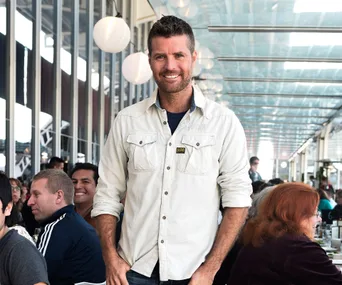Pete Evans has come out with some more diet advice which experts are once again slamming as dangerous.
The celebrity chef has said three meals is a ~ conspiracy from big businesses ~ and we shouldn’t be eating that much.
WATCH: Pete Evans craziest claims, like wifi causing severe health problems…
The My Kitchen Rules star told his 1.5 million followers “whole notion of eating three meals a day” wasn’t healthy, rather it’s a concept “created to help the multinational food industry stay in business by keeping the population craving carbs and not being able to maintain a healthy weight or to stay healthy”.
“Fasting is the ultimate way to limit and help control the body’s insulin production. The latest scientific research suggests that fasting could play a part in the prevention of many conditions, especially obesity and type 2 diabetes,” he said.
Although the concept of three meals has been questioned by nutritionists, Evans’ 10-week program that encourages people to only eat once or twice a day has been slammed by dieticians as potentially dangerous.
Evans said skipping meals and fasting regularly was a “cheaper and quicker” way to eat and lose weight – a far cry from his past eight small meals a day.
WATCH: My Kitchen Rules contestants laugh at Tyson’s angry face.
“Once you are fat adapted, you stop the hunger cravings for food, as you are supplying the body its key nutrients in the most natural way, which in turn makes this way of eating cheaper and quicker,” he said.
Unlike Dr Michael Mosley’s famous 5:2 diet, Evans’ non-fasting days are incredibly restrictive.
Evans’ has also branded his diet as one particularly helpful for diabetics, a claim experts are saying is unsafe.
“Fasting is the ultimate way to limit and help control the body’s insulin production. The latest scientific research suggests that fasting could play a part in the prevention of many conditions, especially obesity and type 2 diabetes,” he said.
Prof Andrikopoulos told news.com.au the chef needed to be careful about the ramifications of what he says.
“He is well-intentioned but he needs to make sure he understands the implications of his advice. If you have certain conditions, intermittent fasting may be dangerous,” he said.



